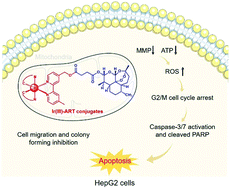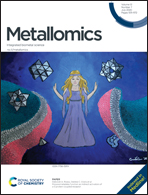Mitochondria-targeted artesunate conjugated cyclometalated iridium(iii) complexes as potent anti-HepG2 hepatocellular carcinoma agents†
Abstract
Hepatocellular carcinoma (HCC) poses a serious threat to people's health worldwide. Artesunate (ART), one of the classical antimalarial drugs, has recently been shown to exert significant cytotoxicity in various cancers, but its bioavailability is low. Cyclometalated iridium(III) complexes have emerged as a promising class of anticancer therapeutic agents. Herein, through conjugation of two of them, three novel Ir(III)–ART conjugates, [Ir(C–N)2(bpy-ART)](PF6) (bpy = 2,2′-bipyridine, C–N = 2-phenylpyridine (ppy, Ir-ART-1), 2-(2-thienyl)pyridine (thpy, Ir-ART-2), and 2-(2,4-difluorophenyl)pyridine (dfppy, Ir-ART-3)) have been synthesized, and their potential as anti-HCC agents was evaluated. We demonstrate that Ir-ART-1–3 display higher cytotoxicity against HCC cell lines than normal liver cells, and they can especially locate to mitochondria of HepG2 cells and induce a series of mitochondria-mediated apoptosis events. Moreover, Ir-ART-1–3 can regulate the cell cycle and inhibit metastasis of HepG2 cells. Finally, in vivo antitumor evaluation also demonstrates the inhibitory activity of Ir-ART-1 on tumor growth. Taken together, these Ir(III)–ART conjugates have the potential to become drug candidates for future anti-HCC treatments.



 Please wait while we load your content...
Please wait while we load your content...